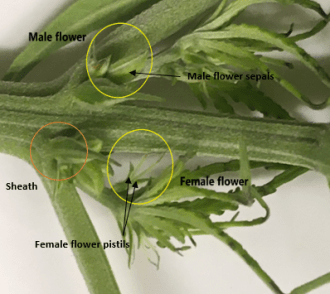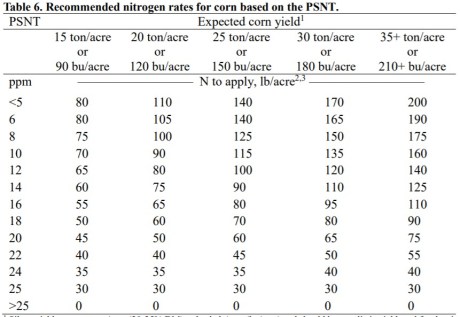Hemp grown with the purpose of maximizing cannabinoid and terpene content is done exclusively with female plants to maximize quality and yield of flower material. With male plants present in this type of production system, pollen will be produced and fertilize female flowers. This will result in plants focusing more energy towards seed production, resulting in diminished quality and cannabinoid content. In order to prevent this, it is important to frequently scout and rogue male plants from fields.

Scouting and removal of male plants should begin at the 4-6 week mark and continue throughout flowering as needed. In order to determine the sex of a plant, look along nodes of individual plants where side branching occurs to observe the formation of male or female flowers (Image 1, above). This may be easier with a hand lens and pre-flowers may initially be covered by a sheath at nodes. Pulling this back during this period may reveal a cluster of male flowers or female flower. Female flowers will first become apparent by the formation of the pistils, which look like two small white hairs emerging from nodes. As these mature they will begin to die back and turn brown. These are the portions of the female flower that are receptive to pollen produced by male flowers. Male flowers will begin forming at nodes in clusters (Image 2). These will initially look like small capsules encased by the male flower sepal before opening. After opening, pollen bearing anthers will begin to mature and develop pollen for dispersal by wind. Pollen from hemp plants has the potential to travel 5km or more with individual plants producing as many as 350,000 individual pollen grains or more.

- With the potential for a single male plant creating such massive amounts of pollen, removal of undesirable males from a flower production system becomes crucial to maintain a high-quality crop. Males may be present even while growing hemp from feminized seed (though the chance is far less with most feminized seed producing 99% females) and male flowers may develop when plants are grown under stressful conditions resulting in hermaphroditic plants. Now’s the time to start scouting your crop for male and hermaphroditic plants and ensure you end up with the best crop possible. Time to go rogue!












You must be logged in to post a comment.